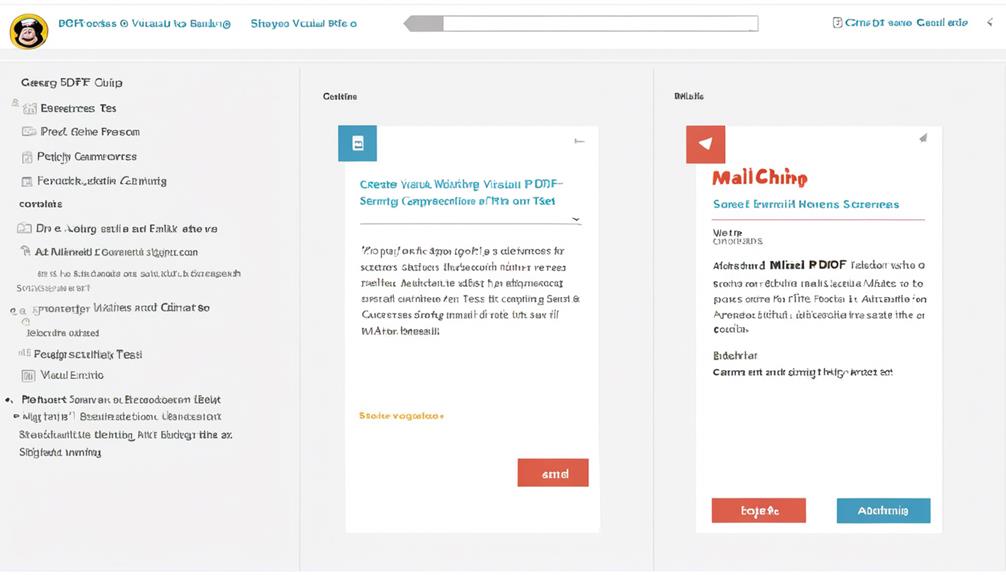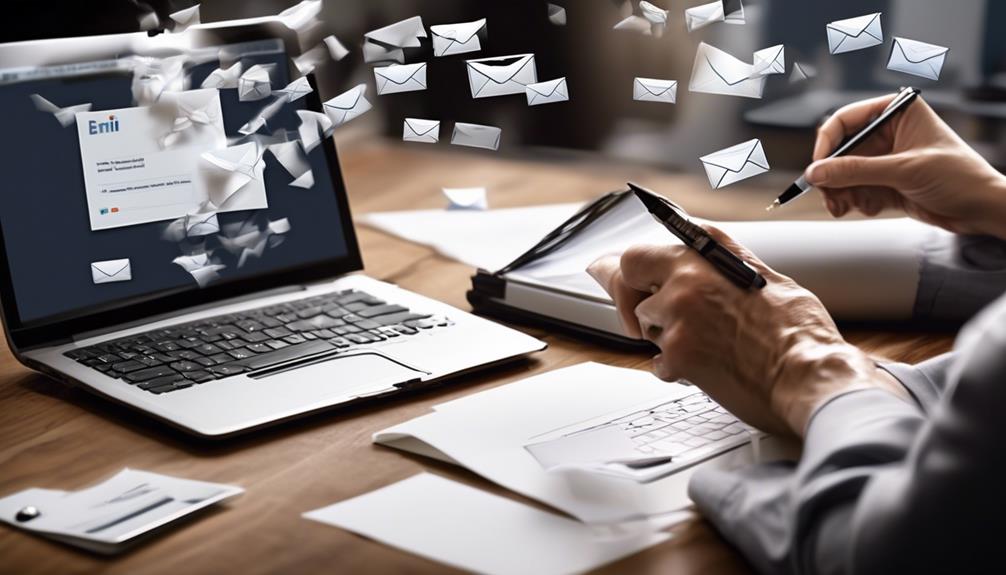When it comes to contacting a school counselor through email, the importance can feel extremely high. Composing a carefully crafted email is essential to make sure your message is received and comprehended.
From addressing the counselor appropriately to structuring your email effectively, there are key elements to consider. Let's delve into the intricacies of composing an email that strikes the right tone and conveys your message clearly.
Key Takeaways
- Subject line should clearly state the purpose of the email.
- Use appropriate salutations and greetings to address the counselor respectfully.
- Keep the email brief and to the point.
- Proofread for errors and ensure professionalism in tone and language.
Importance of Emailing School Counselors
Emailing school counselors plays a crucial role in effectively communicating and seeking support for academic and personal needs. When crafting an email to a school counselor, it's essential to clearly state the purpose of your message in the subject line. A professional tone and language should be maintained throughout the email to ensure clarity and respect in your communication. It's beneficial to include all relevant information in a concise manner, allowing the counselor to understand your situation promptly. Proper salutations and greetings help in addressing the counselor respectfully, establishing a positive tone for the conversation.
In our experiences, reaching out to school counselors via email has yielded positive outcomes. Some of us successfully resolved scheduling issues, while others navigated the college application process with guidance received through email communication. Additionally, emailing school counselors provided a platform to discuss concerns about academic performance and receive the necessary support.
Remember to proofread your email for grammar and spelling errors before hitting send, and always express gratitude by thanking the counselor for their time and assistance.
Crafting a Professional Email

When crafting a professional email to a school counselor, it's crucial to use a clear and concise subject line that accurately summarizes the content of the message. This helps the counselor understand the purpose of your email at a glance.
Address the recipient professionally, using their appropriate title and last name. For instance, you could start with 'Dear Mr. Smith' or 'Dear Counselor Johnson.'
Use a professional font like Times New Roman or Arial, with a font size between 10-12, to ensure readability.
Keeping the email brief and to the point is essential, as counselors are often busy and appreciate clarity.
When ending the email, use a polite and professional closing such as 'Sincerely,' followed by your full name.
These practices not only show respect for the counselor's time but also help you make a strong impression.
Addressing Counselors Appropriately
As we aim to establish respectful and effective communication with school counselors, utilizing a formal salutation like 'Dear Mr./Ms./Dr. [Last Name]' sets a professional tone in our interactions. When addressing a school counselor in an email, it is essential to show proper respect by using their full name without any abbreviations or nicknames. Maintaining a formal and professional language throughout the email demonstrates your professionalism and seriousness in the communication.
To help visualize the key points for addressing counselors appropriately, refer to the table below:
| Key Points | Details |
|---|---|
| Use a formal salutation | Start with 'Dear Mr./Ms./Dr. [Last Name]' to show respect. |
| Avoid abbreviations/nicknames | Address the counselor by their full name for professionalism. |
| Maintain formal language | Use proper grammar, spelling, and punctuation for a professional tone. |
Following these guidelines not only shows your respect for the counselor but also helps in creating a positive and effective communication channel for addressing any questions or concerns.
Structuring Your Email Effectively

To ensure effective communication with school counselors, it's crucial to structure your email with a clear and concise subject line that outlines the purpose of your message.
When writing to your school counselor, it's important to follow a structured approach to ensure your email is professional and respectful. Here are some key points to consider:
- Use a formal salutation: Address the counselor respectfully at the beginning of your email.
- Keep it concise: Focus on the main purpose of your email to avoid overwhelming the counselor with unnecessary details.
- End politely: Close your email with a polite farewell and include your full name for clarity and professionalism.
Polishing Your Email Before Sending
Transitioning from structuring your email effectively to polishing your email before sending, we ensure our communication with school counselors maintains a professional and respectful tone through careful proofreading and attention to detail. When sending an email, especially in crucial situations like college admissions emails, it is essential to pay close attention to the finer points of your message. Here are some key steps to consider before hitting the send button:
| Before Sending Your Email | Tips |
|---|---|
| Proofreading | Check for spelling, grammar, and punctuation errors. |
| Tone and Language | Ensure professionalism and courtesy in your language. |
| Conciseness | Keep the email focused and avoid unnecessary details. |
| Information Check | Double-check all attachments, contact details, and relevant information. |
Address the admissions officer or school counselor as you would in a personal email by using a professional and concise subject line. By following these steps, you can refine your email to a college or counselor, ensuring clarity and effectiveness in your communication.
Frequently Asked Questions
How Do You Format an Email to a Counselor?
When formatting an email to a counselor, we focus on clarity and professionalism. We ensure the subject line is succinct.
We address the counselor respectfully and introduce ourselves with relevant details. The purpose of the email is clearly stated, questions asked, and concerns shared.
We end with a polite thank you and appropriate closing. Proofreading for clarity, grammar, and spelling is crucial before hitting send.
How Do You Start an Email to a Guidance Counselor?
When we start an email to a guidance counselor, we should always begin with a polite and formal greeting, like 'Dear [Counselor's Name].'
It's important to introduce ourselves and state our purpose clearly. Offering any necessary background information or context can also be helpful.
Lastly, we should ask our question or make our request in a concise manner. Ending the email with a polite closing, such as 'Thank you for your time and assistance,' is a thoughtful touch.
How Do You Address a Counselor in an Email?
When addressing a counselor in an email, we recommend using a formal salutation like 'Dear Mr./Ms./Dr. [Last Name]' or 'Dear Admissions Counselor' if the name is unknown.
It's essential to maintain professionalism by avoiding abbreviations, using proper grammar, and a respectful tone.
End the email with a polite closing like 'Sincerely' or 'Best regards,' followed by your full name.
These steps ensure your communication is clear, respectful, and effective.
How Do You Write an Email to an Academic Advisor?
When writing an email to an academic advisor, we should ensure the subject line is clear and concise.
Address the advisor with respect, introduce ourselves briefly, and state our purpose and questions clearly.
It's important to end the email politely with our full name.
These steps help in effective communication with academic advisors.
Can I Use the Same Format for Writing an Email to a School Counselor for an Internship Application?
Yes, using the same format for writing an email to a school counselor for an internship application can be helpful in ensuring consistency and professionalism. When writing effective internship emails, it’s important to maintain a clear and concise structure while highlighting relevant qualifications and expressing genuine interest in the opportunity.
Conclusion
In conclusion, emailing a school counselor is a crucial communication skill for students. Remember, a well-crafted email can make a positive impression and help you get the support you need.
So, polish your email, address them respectfully, and structure it effectively. Just like a well-tuned instrument creates beautiful music, a well-written email to your school counselor can harmonize your academic journey.










